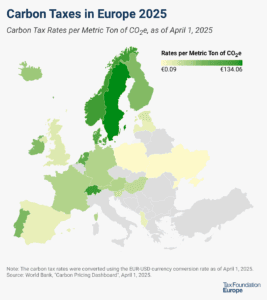
The Wealth Tax Discussion Is Back
4 min readBy:The European Union (EU) is eyeing a new wealth taxA wealth tax is imposed on an individual’s net wealth, or the market value of their total owned assets minus liabilities. A wealth tax can be narrowly or widely defined, and depending on the definition of wealth, the base for a wealth tax can vary. to raise more revenue from own resources, fund the EU budget, and repay the EU debt accumulated to finance the post-pandemic economic recovery. Over the last three decades, most EU countries have repealed their net wealth taxes, acknowledging that the taxes disincentivized entrepreneurship and harmed innovation and long-term growth.
Last month, a European citizens’ initiative (ECI) gathered the seven signatures required to request that the European Commission consider a legislative proposal for a wealth tax on the EU’s highest-income individuals. Once the ECI is registered, the initiators have one year to collect 1 million signatures. Then, the European Commission would evaluate the proposal and publish a formal response, although it is not obliged to propose any new rules.
This initiative was sparked by a panel discussion at an EU TaxA tax is a mandatory payment or charge collected by local, state, and national governments from individuals or businesses to cover the costs of general government services, goods, and activities. Observatory event exploring different wealth tax proposals.
During the panel discussion, several shortcomings of current wealth taxes were mentioned. Florian Scheuer, a professor of economics at the University of Zurich, mentioned that, in the case of Switzerland, the net wealth tax has low thresholds, “meaning that many more people than only the most wealthy pay it.” Gabriel Zucman, director of the EU Tax Observatory, said wealth taxes “dramatically fail” to tax the richest because they do not adequately cover financial assets. Other speakers mentioned the “relatively high administrative burden due to the necessity of regular assessments of the tax baseThe tax base is the total amount of income, property, assets, consumption, transactions, or other economic activity subject to taxation by a tax authority. A narrow tax base is non-neutral and inefficient. A broad tax base reduces tax administration costs and allows more revenue to be raised at lower rates. ” and highlighted the difficulty in enforcing a wealth tax at the national level due to “capital becoming increasingly mobile.”
Kristoffer Berg, a research fellow at the Oxford University Centre for Business Taxation, considers that “in settings with large unrealized capital gains,” wealth taxes can encourage the wealthy to realize those gains. In this case, the wealth tax should be broad, both across wealth levels and asset types, and with a low rate.” Additionally, an Oxfam tax policy advisor mentioned that in designing such taxes, “it’s really important to focus on the very richest.”
These discussions of a proposed wealth tax for the European Union have included little information about the current trends in wealth taxation across developed countries. However, those trends and the current state of wealth taxes in OECD countries can provide context for this EU proposal.
Thirteen OECD countries have imposed net wealth taxes since 1965, but the number dropped to four—in Colombia, Norway, Spain, and Switzerland—by 2023, with governments increasingly acknowledging the economic harms intrinsic to such taxes. According to the OECD data, the countries that collected revenues from net wealth taxes on individuals in 2021 were Colombia, France (currently a real estate taxAn estate tax is imposed on the net value of an individual’s taxable estate, after any exclusions or credits, at the time of death. The tax is paid by the estate itself before assets are distributed to heirs. ), Norway, Spain, and Switzerland. Revenues from net wealth taxes made up 4.03 percent of revenues in Switzerland, 0.92 percent in Norway, 0.51 percent in Spain, 0.45 percent in Colombia, and 0.18 percent in France—making up just 1.2 percent of total revenues from these five countries, on average, in 2021.
According to an OECD report, wealth taxes can disincentivize entrepreneurship, leading to less innovation and less long-term growth. However, the report also suggests net wealth taxes could spur investment and risk-taking. Essentially, the argument is that because a wealth tax would erode the after-tax return for an entrepreneur, that entrepreneur might engage in even riskier ventures to maximize a potential return. However, a wealth tax would be a particularly poor way to encourage risk-taking because wealthy individuals could choose to increase their consumption to reduce their wealth.
Another recently published paper describes a different mechanism through which wealth taxes affect corporate financial policies. The study finds that a significant increase in dividend payouts occurs when a substantial increase in stock prices is paired with the existence of individual wealth taxes. This pattern is more pronounced in closely held companies. As stock prices rise to the point of substantially increasing the wealth tax bill of controlling shareholders, these shareholders can induce companies to make a dividend payout. Additionally, these larger dividend payouts are associated with lower levels of subsequent investment.
Over the years, countries have repealed their net wealth taxes for various reasons, including economic impact. French Finance Minister Bruno LeMaire has made it clear that the partial repeal of the wealth tax in France was part of a reform package designed to “attract more foreign investment.” The French reform package also included a planned reduction in the corporate tax rate, which has been implemented over several years.
Recent wealth tax developments in Europe have pushed Spain’s regional governments to appeal a new “solidarity wealth tax” to the Constitutional Court, and Norway has approved a higher exit tax as billionaires are fleeing the country. A tax expert at Civita, a think tank in Norway, reinforced the idea that wealth taxes distort business decisions: “it forces owners to ask their companies for dividends, sometimes bigger than profits. It substantially increases the will not to invest in companies.” And voters in Geneva, Switzerland, recently rejected an extra “solidarity” levy on individuals with more than 3 million francs ($3.4 million) in assets. Even the local government had spoken out against the increase.
Given that wealth taxes collect little revenue and have the potential to disincentivize entrepreneurship and investment, perhaps European countries should repeal them rather than implement one across the continent.
Share this article




